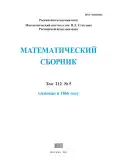Vol 212, No 5 (2021)
- Year: 2021
- Articles: 6
- URL: https://bakhtiniada.ru/0368-8666/issue/view/7477
Manifolds of isospectral arrow matrices
Abstract
An arrow matrix is a matrix with zeros outside the main diagonal, the first row and the first column. We consider the space $M_{\operatorname{St}_n,\lambda}$ of Hermitian arrow $(n+1)\times (n+1)$-matrices with fixed simple spectrum $\lambda$. We prove that this space is a smooth $2n$-manifold with a locally standard torus action: we describe the topology and combinatorics of its orbit space. If $n\geqslant 3$, the orbit space $M_{\operatorname{St}_n,\lambda}/T^n$ is not a polytope, hence $M_{\operatorname{St}_n,\lambda}$ is not a quasitoric manifold. However, there is an action of a semidirect product $T^n\rtimes\Sigma_n$ on $M_{\operatorname{St}_n,\lambda}$, and the orbit space of this action is a certain simple polytope $\mathscr{B}^n$ obtained from the cube by cutting off codimension-2 faces. In the case $n=3$, the space $M_{\operatorname{St}_3,\lambda}/T^3$ is a solid torus with boundary subdivided into hexagons in a regular way. This description allows us to compute the cohomology ring and equivariant cohomology ring of the 6-dimensional manifold $M_{\operatorname{St}_3,\lambda}$ and another manifold, its twin. Bibliography: 32 titles.
Matematicheskii Sbornik. 2021;212(5):3-36
 3-36
3-36


Monotone path-connectedness of Chebyshev sets in three-dimensional spaces
Abstract
We characterize the three-dimensional Banach spaces in which any Chebyshev set is monotone path-connected. Namely, we show that in a three-dimensional space $X$ each Chebyshev set is monotone path-connected if and only if one of the following two conditions is satisfied: any exposed point of the unit sphere of $X$ is a smooth point or $X=Y\oplus_\infty \mathbb R$ (that is, the unit sphere of $X$ is a cylinder). Bibliography: 17 titles.
Matematicheskii Sbornik. 2021;212(5):37-57
 37-57
37-57


Interpolation sequences and nonspanning systems of exponentials on curves
Abstract
Interpolation sequences of the form $\{\pm\lambda_n\}$ $(\lambda_n > 0)$ are investigated, and also the problem of when the system of exponentials $\{e^{\pm\lambda_n z}\}$ is nonspanning on the family of arbitrary rectifiable curves in the uniform norm.In terms of the interpolation nodes (or equivalently, the exponents of the system of exponentials) a criterion for the interpolation problem to be solvable is established and the strong nonspanning property of $\{e^{\pm\lambda_n z}\}$ is proved. This significantly improves some known results, in particular, results due to Korevaar, Dixon and Berndtsson.Bibliography: 23 titles.
Matematicheskii Sbornik. 2021;212(5):58-79
 58-79
58-79


A trace formula for higher order ordinary differential operators
Abstract
We obtain a first-order trace formula for a higher order differential operator on a closed interval in the case where the perturbation operator is the operator of multiplication by a finite complex-valued charge. For operators of even orders $n\ge4$, the result contains a term of new type, previously unknown.Bibliography: 15 titles.
Matematicheskii Sbornik. 2021;212(5):80-101
 80-101
80-101


On $DA$-endomorphisms of the two-dimensional torus
Abstract
It is proved that in each homotopy class of continuous mappings of the two-dimensional torus to itself that induce a hyperbolic action on the fundamental group, as long as it is free of expanding mappings, there exists an $A$-endomorphism $f$ whose nonwandering set consists of an attracting hyperbolic sink and a nontrivial one-dimensional collapsing repeller, which is a one-dimensional orientable lamination, locally homeomorphic to the direct product of a Cantor set and a line segment. Moreover, the unstable $Df$-invariant subbundle of the tangent space to the repeller has the property of uniqueness. Bibliography: 23 titles.
Matematicheskii Sbornik. 2021;212(5):102-132
 102-132
102-132


Variational method for elliptic systems with discontinuous nonlinearities
Abstract
A system of two elliptic equations with discontinuous nonlinearities and homogeneous Dirichlet boundary conditions is studied. Existence theorems for strong and semiregular solutions are deduced using a variational method. A strong solution is called semiregular if the set on which the values of the solution are points of discontinuity of the nonlinearity with respect to the phase variable has measure zero. Classes of nonlinearities are distinguished for which the assumptions of the theorems established here hold. The variational approach in this paper is based on the concept of a quasipotential operator, by contrast with the traditional approach, which uses the generalized Clark gradient. Bibliography: 22 titles.
Matematicheskii Sbornik. 2021;212(5):133-152
 133-152
133-152











